H - Past Witnesses
- Kenneth Hagin - Robert Haldane - Costen Harrell - RK Harrison - James Hastings - Jack Hayford - George Hegel - Thomas Helwys - Carl Henry - Nicholas Herman - Junior Hill - Nelson E Hinman -
kenneth e hagin
 Joe Carter
Joe Carter
While Roberts was one of the first to combine New Thought principles with faith healing, the most prominent evangelist of the prosperity gospel—and the father of the Word of Faith movement— was Kenneth E. Hagin (1917–2003). In 1962, Hagin founded Kenneth Hagin Ministries to spread his teachings, which emphasize speaking words of faith as a way to manifest health, wealth, and other blessings.
One of his most influential ideas was his distinguishing between the logos (the written Word of God) and the rhema (the spoken or revealed Word). He argued that rhema is the means by which believers activate God’s promises. As Russell S. Woodbridge says, “More than any other factor, the Word of Faith movement was the vehicle responsible for spreading prosperity teaching across the United States in the late 20th century.”
--Joe Carter; Gospel Coalition; 9 Things You Should Know About the Prosperity Gospel 9.2.23
One of his most influential ideas was his distinguishing between the logos (the written Word of God) and the rhema (the spoken or revealed Word). He argued that rhema is the means by which believers activate God’s promises. As Russell S. Woodbridge says, “More than any other factor, the Word of Faith movement was the vehicle responsible for spreading prosperity teaching across the United States in the late 20th century.”
--Joe Carter; Gospel Coalition; 9 Things You Should Know About the Prosperity Gospel 9.2.23
robert haldane
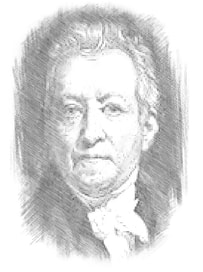 Robert Haldane
Robert Haldane
All believers are saints, and in one sense all of them are equally sanctified (ie, set apart for God). They are equally separated or consecrated to God, and equally justified, but they are not all equally holy. The work of sanctification in them is progressive. There are babes, young men, and fathers in Christ. Some are weak in faith, and some are strong; but none of them are yet perfect, neither have they attained to that measure of holiness at which it is their duty constantly to aim (see Phil 3:12).
They are therefore to forget those things which are behind, and to reach forth to those things which are before, and are commanded to grow in grace, and in the knowledge of our Lord and Savior Jesus Christ.
The path of the just is as the shining light, that shines more and more until the perfect day (Proverbs 4:18)
From these premises the conclusion follows, that no one truly associates themselves with the faithful (Christ’s true people), who do not place a certain degree of confidence in the Lord’s kindness to them; although being undeserving and wretched sinners, being called by His goodness, they aspire to holiness. ‘For He has not called us to uncleanness, but to holiness.’ --Robert Haldane; MacDonald Publishing Company, An Exposition of Romans
They are therefore to forget those things which are behind, and to reach forth to those things which are before, and are commanded to grow in grace, and in the knowledge of our Lord and Savior Jesus Christ.
The path of the just is as the shining light, that shines more and more until the perfect day (Proverbs 4:18)
From these premises the conclusion follows, that no one truly associates themselves with the faithful (Christ’s true people), who do not place a certain degree of confidence in the Lord’s kindness to them; although being undeserving and wretched sinners, being called by His goodness, they aspire to holiness. ‘For He has not called us to uncleanness, but to holiness.’ --Robert Haldane; MacDonald Publishing Company, An Exposition of Romans
Costen Harrell
Costen Jordan Harrell (February 12, 1885 – December 28, 1970) was a bishop of The Methodist Church in the United States, elected in 1944. Costen earned the A.B. degree in 1906 from Trinity College (now Duke University). He earned the B.D. and M.A. degrees in 1910 from Vanderbilt University
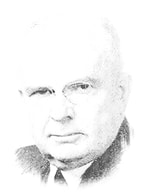 Costen Harrell
Costen Harrell
There is reason to fear that we are forgetting how to meditate. The haste of our modern life militates against it. We love the garish day. Much of Christianity is a sickly bloom because we have no quiet place in which the roots of faith may grow. We meet the day's temptations before we are ready for them. We undertake to lead others before we have mastered ourselves. We try to force the bloom before we have rooted ourselves in Jesus Christ. Return, O soul, to the secret place and linger there. A godly life, like the flowers, is rooted in the shadows to bloom in the night."
-Costen Harrell; Walking With God; 1928
-Costen Harrell; Walking With God; 1928
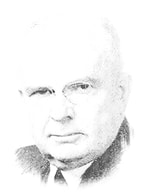 Costen Harrell
Costen Harrell
A broken heart is exceedingly sensitive to spiritual things. In sore need of divine help, Jeremiah discovered a wonderful thing about Go's mercies toward us. They are not stereotyped. They are not monotonous and lifeless and loveless. They are new every morning, as fresh as the dew on the grass, "to the level of every day's most quiet need."
-Costen Harrell; Walking With God; 1928
R.K. Harrison
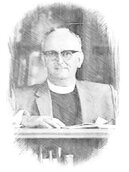 R.K. Harrison
R.K. Harrison
"This chapter (Lam 4:7-8) is one of the most graphic in the book in its description of the physical suffering of the people of Jerusalem, and what makes it especially vivid is the use of color. In fact, color is one of the striking features of the chapter: gold and scarlet (vv. 1, 2, 5), white, red, sapphire, black (vv. 7, 8). Bright colors represent the earlier conditions; as the famine progresses, the colors are erased from the picture and all that remains is dullness and blackness."
-R. K. Harrison, Jeremiah and Lamentations: An Introduction and Commentary
-R. K. Harrison, Jeremiah and Lamentations: An Introduction and Commentary
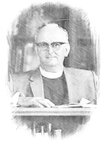 R.K. Harrison
R.K. Harrison
"For those who esteemed themselves as high-quality gold, the kind of experience which reduced them to the level of base metal in the opinion of their enemies was of harrowing psychological and spiritual proportions." -R. K. Harrison, Jeremiah and Lamentations: An Introduction and Commentary
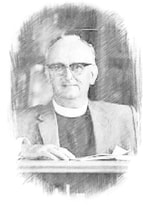 R.K. Harrison
R.K. Harrison
"Dirge poetry of the kind exemplified by Lamentations was by no means uncommon in Near Eastern antiquity. The Sumerians were the first to write sombre [sic] works commemorating the fall of some of their great cities to enemy invaders, one of the most celebrated being the lament over the destruction of Ur. The author of Lamentations stood therefore in a long and respected literary tradition when he bewailed the destruction of Jerusalem and the desolation of Judah in 587 B.C."
- R. K. Harrison, Jeremiah and Lamentations: An Introduction and Commentary, p. 195.
- R. K. Harrison, Jeremiah and Lamentations: An Introduction and Commentary, p. 195.
james hastings
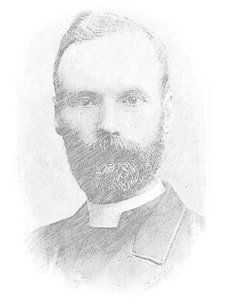 James Hastings
James Hastings
A word is the true expression of him who utters it. We have various ways of communicating with one another, but the chief apparatus, which we call the body, sits a tenant who is wholly distinct from the body. This tenant thinks, wills, feels--lives a life separate from the sense--a life sacred and invisible. How shall this tenant communicate with the out world? By speech: alphabets and words come to his help; the lip is taught their use, and then the sacred tenant within the body can utter itself to the world. So, St John conceives Go as cut off from man by many barriers; "no man hath seen God at any time, nor can he see him." How shall God communicate with the creature He has made? He does so by His Word. Christ is the very mind of God translating itself into symbols which man can comprehend. As your word is yourself uttered, so Christ is God uttered. "In the beginning was the Word, and the Word was with God, and the Word was God."
-James Hastings; The Greatest Texts of the Bible John I-XII; 1912
-James Hastings; The Greatest Texts of the Bible John I-XII; 1912
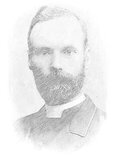 James Hastings
James Hastings
"The phrase "I am Life." points to all Christ's work upon us as a life-giving Spirit, a Quickener and an Inspirer. Dead men cannot walk a road. It is no use making a path if it starts from a cemetery. Christ taught that men apart from Him are dead, and that the only life that they can have by which they can be knit to God is the Divine life which was in Himself, and of which He is the source and the principle for the whole world."
-James Hastings; The Greatest Texts of the Bible John I-XII; 1912
-James Hastings; The Greatest Texts of the Bible John I-XII; 1912
jack hayford
Jack Williams Hayford (June 25, 1934 – January 8, 2023) was an American author, Pentecostal minister, and Chancellor Emeritus of The King's University (formerly The King's College and Seminary). He was formerly a senior pastor of The Church on the Way in Van Nuys, California, one of a handful of flagship churches in the Foursquare denomination, and was the fourth President of the International Church of the Foursquare Gospel. He was widely known for his involvement in the Promise Keepers movement and for being a prolific author and songwriter, with over 600 hymns and choruses in his catalog.
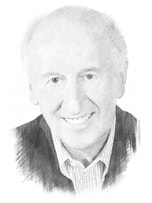 Jack Hayford Files
Jack Hayford Files
“Forgiveness. It is not in denying the hopeless days that take place when others reject us or turn on us. It is not in minimizing the pain we experience at the hands of those who seem bent on ruining our lives. People turn on people. They betray one another. Crass unkindness, vicious plottings, horrible and intentional antagonisms are shown, and calling it a hopeless day hardly describes the extended season of struggle that many of us face at times. But there is a lesson at Calvary. Forgive everyone—anyone—whom you think has failed you, hurt you, offended you. If you think they’ve done anything to ruin your day, ruin your life, ruin your opportunities, ruin your dreams, or block your goals—forgive them. Forgiving others is the key to living in the liberty of the freeing forgiveness Jesus has given us, and it’s the first step toward finding hope for a hopeless day, not to mention opening the door to new days unimagined.”
― Jack W. Hayford, Hope for a Hopeless Day: Encouragement and Inspiration When You Need it Most
― Jack W. Hayford, Hope for a Hopeless Day: Encouragement and Inspiration When You Need it Most
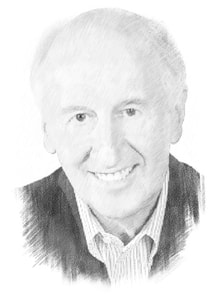 Jack Hayford Files
Jack Hayford Files
“This is not more cultural happenstance. It is a blitzkrieg from the darkness—a frontal attack of calculated and evil dimensions plotted by the adversary of God, man and all that is good, and being advanced by cunning, demonic hordes who can only be blocked in one way: prayer. Call the people to pray. Teach them to counterattack. Unveil My Word to them so that, by calling on Me through the grace I readily give when they invoke the name of My Son, they may unleash My power. As they accept this partnership I call them to, praying that My Kingdom may enter the world of those they love “on earth,” I will answer them by My Spirit’s power—working My will “as it is in heaven.” Well, that is really what happened. I don’t mean, of course, that God stepped into my office in the sense of physical appearance. Rather He made His presence and will known by the means He has revealed in His eternal Word of truth—the Holy Bible. In that book, which is the ultimate authority on all life’s issues, both eternal and temporal, He says that He will speak at times to people by “prophecy.” In this use, prophecy is not a reference to anything arbitrary or arcane—God is never random; nor is He weird. (Toss out the pundits who publish cleverly”
― Jack Hayford, Secrets of Intercessory Prayer, The: Unleashing God's Power in the Lives of Those You Love
― Jack Hayford, Secrets of Intercessory Prayer, The: Unleashing God's Power in the Lives of Those You Love
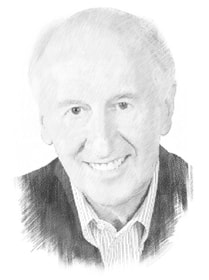 Jack Hayford Files
Jack Hayford Files
“The Glorious Garment of Praise, PRAISE AND WORSHIP. The Hebrew root for “garment” (‘atah) shows praise as more than a piece of clothing casually thrown over our shoulders. It literally teaches us “to wrap” or “cover” ourselves—that the garment of praise is to leave no openings through which hostile elements can penetrate. This garment of praise repels and replaces the heavy spirit. This special message of instruction and hope is for those oppressed by fear or doubt. “Put on” this garment. A warm coat from our closet only resists the cold wind when it is “put on.” When distressed, be dressed—with praise! Act according to God’s Word!”
― Jack Hayford, New Spirit-Filled Life Bible: Kingdom Equipping Through the Power of the Word, New King James Version
― Jack Hayford, New Spirit-Filled Life Bible: Kingdom Equipping Through the Power of the Word, New King James Version
Georg Hegel
Sept 26, 2022: Scott E Olson: Relational Theology Yes; Panentheism No
Many 19th and 20th century Christian thinkers have contributed to relational theology including (among others) Georg Hegel, Horace Bushnell, I. A. Dorner, Emil Brunner, K. Kitamori, Juergen Moltmann, and Robert Jenson. Open theism is a type of relational theology and was promoted especially by Clark Pinnock, John Sanders and Greg Boyd (among others). Among Christian philosophers it (relational theology) has been embraced Keith Ward, William Hasker, Nicholas Wolterstorff and others.
Many 19th and 20th century Christian thinkers have contributed to relational theology including (among others) Georg Hegel, Horace Bushnell, I. A. Dorner, Emil Brunner, K. Kitamori, Juergen Moltmann, and Robert Jenson. Open theism is a type of relational theology and was promoted especially by Clark Pinnock, John Sanders and Greg Boyd (among others). Among Christian philosophers it (relational theology) has been embraced Keith Ward, William Hasker, Nicholas Wolterstorff and others.
Thomas Helwys
Thomas Helwys, (born c. 1550—died c. 1616), English Puritan leader, member of a Separatist group that emigrated to Amsterdam (1608), where he helped organize the first Baptist church. Returning to England (1611/12) to witness to his belief in adult Baptism and greater individual moral responsibility (against extreme Calvinist predestination), Helwys established the first General Baptist congregation in London. He was imprisoned for advocating universal religious tolerance and the independence of the church from state control.
 Thomas Helwys
Thomas Helwys
"If the Kings people be obedient and true subjects, obeying all humane laws made by the King, our Lord the King can require no more: for men's religion to God is betwixt God and themselves; the King shall not answer for it, neither may the King be judge between God and man."
— Thomas Helwys; A Short Declaration of the Mystery of Iniquity
— Thomas Helwys; A Short Declaration of the Mystery of Iniquity
carl henry
Carl Ferdinand Howard Henry (January 22, 1913 – December 7, 2003) was an American evangelical Christian theologian who provided intellectual and institutional leadership to the neo-evangelical movement in the mid-to-late 20th century. After graduating high school in 1929, Henry began work as a freelance reporter. Within three years, he was the editor of a major newspaper in Long Island. He had become a “hard-nosed journalist given to pagan pleasures,” as Timothy George writes in Essential Evangelicalism. He was ordained in 1942 after graduating from Northern Baptist Theological Seminary and went on to teach and lecture at various schools and publish and edit many works surrounding the neo-evangelical movement. His early book, The Uneasy Conscience of Modern Fundamentalism (1947), was influential in calling evangelicals to differentiate themselves from separatist fundamentalism and claim a role in influencing the wider American culture. Uneasy Conscience challenged evangelical leaders to address justice-related issues and to condemn social evils such as racism, exploitation of labor, and aggressive warfare. According to Henry, we should not be able to “look with indifference upon miscarriages of justice in the law courts, usury, plundering the needy, failure to feed and clothe the poor, and over-charging for merchandise”. In true Kuyperian-fashion, he writes, “The evangelical missionary message cannot be measured for success by the number of converts only. The Christian message has a salting effect upon the earth. It aims at a re-created society” He was involved in the creation of numerous major evangelical organizations that contributed to his influence in Neo-evangelicalism and lasting legacy, including the National Association of Evangelicals, Fuller Theological Seminary, Evangelical Theological Society, Christianity Today magazine (of which he was the founding editor), and the Institute for Advanced Christian Studies. The Carl F. H. Henry Institute for Evangelical Engagement at Southern Baptist Theological Seminary and the Carl F. H. Henry Center for Theological Understanding at Trinity International University seek to carry on his legacy. His ideas about Neo-evangelism are still debated to this day and his legacy continues to inspire change in American social and political culture. (Continued Below)
The Evangelical Imagination: How Stories, Images, and Metaphors Created a Culture in Crisis
American evangelicals have long been proficient at introspective assessments of our own movement. Since the mid-1980s, sociologists like James Davison Hunter have diagnosed evangelicalism’s contemporary virtues and pathologies, while thinkers like Mark Noll and David Bebbington have sought to interpret the movement through a historical lens. Such diagnoses have often taken on an urgent tone that, rather than undermining the movement, has been one of the keys to its endurance and vitality. In 1967, Carl Henry wrote Evangelicals at the Brink of Crisis, warning that evangelicals were in danger of being culturally marginalized. In 1976, he penned a similarly anxious missive, Evangelicals in Search of an Identity. If evangelicalism is anything at all, it is probably a movement preoccupied with such a search and with the social alienation that demands it. Not much has changed since then: Russell Moore, who is Carl Henry’s closest heir at Christianity Today, has recently penned an “Altar Call for Evangelical America,” while historian Thomas Kidd in 2019 gave us Who Is an Evangelical? The History of a Movement in Crisis.
(Matthew Lee Anderson/Public Discourse 11/13/23)
Read More>>>>>
American evangelicals have long been proficient at introspective assessments of our own movement. Since the mid-1980s, sociologists like James Davison Hunter have diagnosed evangelicalism’s contemporary virtues and pathologies, while thinkers like Mark Noll and David Bebbington have sought to interpret the movement through a historical lens. Such diagnoses have often taken on an urgent tone that, rather than undermining the movement, has been one of the keys to its endurance and vitality. In 1967, Carl Henry wrote Evangelicals at the Brink of Crisis, warning that evangelicals were in danger of being culturally marginalized. In 1976, he penned a similarly anxious missive, Evangelicals in Search of an Identity. If evangelicalism is anything at all, it is probably a movement preoccupied with such a search and with the social alienation that demands it. Not much has changed since then: Russell Moore, who is Carl Henry’s closest heir at Christianity Today, has recently penned an “Altar Call for Evangelical America,” while historian Thomas Kidd in 2019 gave us Who Is an Evangelical? The History of a Movement in Crisis.
(Matthew Lee Anderson/Public Discourse 11/13/23)
Read More>>>>>
Uncommon Evangelical Lessons from Carl Henry (1913–2003)
It is often difficult to know how to navigate between religious factions on the right and the left. To the right may be those who emphasize good doctrine but seem to stand at arm’s length from the world. To the left may be those who emphasize social engagement and activism but seem to have compromised theological fidelity.
Yet we are not the first generation of evangelicals to grapple with this tension. The evangelicals of the early twentieth century also found themselves uncomfortably sandwiched between two increasing extremes. But, by God’s providence, several evangelical theologians in the mid-twentieth century began championing a different way. The most influential of them was Carl F.H. Henry.
(Kenneth E Ortez/Desiring God 3/21/22)
Read More>>>>>
It is often difficult to know how to navigate between religious factions on the right and the left. To the right may be those who emphasize good doctrine but seem to stand at arm’s length from the world. To the left may be those who emphasize social engagement and activism but seem to have compromised theological fidelity.
Yet we are not the first generation of evangelicals to grapple with this tension. The evangelicals of the early twentieth century also found themselves uncomfortably sandwiched between two increasing extremes. But, by God’s providence, several evangelical theologians in the mid-twentieth century began championing a different way. The most influential of them was Carl F.H. Henry.
(Kenneth E Ortez/Desiring God 3/21/22)
Read More>>>>>
Henry’s theological work has focused on refuting secular and liberal views. His basic apologetic stance is that of presuppositionalism. All reasoning begins with certain unproved assumptions or axioms that cannot be antecedently proved but can be indirectly verified by tracing out their implications in the test of coherency which is the highest test of truth for Henry. The Christian worldview begins with the presupposition that God is revealed in the Bible, the source from which all of the rest of theology is derived. God has revealed God’s own mind in a clear, univocal, rational fashion (in contrast with the Neo-orthodox view of revelation which understands truth as personal encounter). Modern theology has diluted the message of the Bible by subjecting it to other norms (human experience or some formal principle). Scripture is divinely inspired for Henry and this involves a supernatural influence upon scriptural writers whereby the Spirit assures the truth and trustworthiness of their proclamation, the scriptures are inspired as an "objective deposit of faith" which is inerrant. Henry furthermore claims that this inerrancy is proclaimed by scripture itself. The Spirit is also involved in scriptural interpretation, guiding the faithful exegete to a right understanding of the text. Henry’s doctrine of God stresses that "He" is the only living God of the Bible, the creator (ex nihilo) and source of all life who is clearly distinguishable from his creatures. Henry rejects any panentheism. God continues to exercise providential care over his children, preserving it and guiding it to good ends. The doctrine of the Trinity is seen by Henry to solve the ancient problem of the one and the many. While Henry does not necessarily reject evolutionary theory altogether he does take exception with it where he sees it as directly in conflict with biblical teachings, such as the special divine act in the creation of Adam. Sin and evil are for Henry the result of Satan’s rebellion, but God uses this evil to accomplish higher ends, and in the eschaton God will remove all evil. Henry rejects any form of afterlife that will not distinguish saved and lost. Henry rebuts idea that Christ may be found in other religions, and rejects the idea of implicit faith. Soon after Henry’s death on December 7, 2003, David S. Dockery wrote this tribute: “Those who met him for the first time often stood in awe of his giant intellect. But soon, almost without exception, they became more impressed with his humility and gracious spirit.”
Nicholas Herman |
Brother Lawrence (c. 1605-1691)
|
 Nicholas Herman
Nicholas Herman
That we ought to give ourselves up to GOD, with regard both to things temporal and spiritual, and seek our satisfaction only in the fulfilling of His will, whether He lead us by suffering or by consolation, for all would be equal to a soul truly resigned. That there needed fidelity in those drynesses, or insensibilities and irksomenesses in prayer, by which GOD tries our love to Him; that then was the time for us to make good and effectual acts of resignation, whereof one alone would oftentimes very much promote our spiritual advancement. That as for the miseries and sins he heard of daily in the world, he was so far from wondering at them, that, on the contrary, he was surprised there were not more, considering the malice sinners were capable of: that for his part, he prayed for them; but knowing that GOD could remedy the mischiefs they did, when He pleased, he gave himself no further trouble. That to arrive at such resignation as GOD requires, we should watch attentively over all the passions which mingle as well in spiritual things as those of a grosser nature: that GOD would give light concerning those passions to those who truly desire to serve Him. That if this was my design, viz., sincerely to serve GOD, I might come to him as often as I pleased, without any fear of being troublesome; but if not, that I ought no more to visit him. --Nicholas Herman
---------------------------------------
junior hill
Junior Hill, ‘country preacher’ embraced by the SBC, dies
HARTSELLE, Ala. (BP) – Junior Hill, a beloved and in-demand evangelist among Southern Baptists for more than 50 years, died Jan. 3 at his home in Hartselle, Ala. He was 87. Hill conducted more than 1,800 revivals – from Sunday-to-Sunday meetings for many years, adding “Harvest Days” in subsequent years – and was a sought-after speaker for pastors’ conferences, state conventions and evangelism meetings across the country. He also spoke in various camp meeting, seminary and college settings and engaged in numerous overseas campaigns. (Art Toalston/Kentucky Today 1/4/24)
READ MORE>>>>>
HARTSELLE, Ala. (BP) – Junior Hill, a beloved and in-demand evangelist among Southern Baptists for more than 50 years, died Jan. 3 at his home in Hartselle, Ala. He was 87. Hill conducted more than 1,800 revivals – from Sunday-to-Sunday meetings for many years, adding “Harvest Days” in subsequent years – and was a sought-after speaker for pastors’ conferences, state conventions and evangelism meetings across the country. He also spoke in various camp meeting, seminary and college settings and engaged in numerous overseas campaigns. (Art Toalston/Kentucky Today 1/4/24)
READ MORE>>>>>
---------------------------------------
nelson e hinman
"But I say the power of habit is rooted in the deepest recesses of our minds, well below the areas of quick recall...All of our skills are developed by good practiced habits. It gets down into our subconscious mind and controls us. As long as you drive your car having to think about everything you do, you are a dangerous driver. But by "practicing" your driving, it becomes habit. Once you establish the habit of driving, you become a very good driver. How do you do this? By practice....
The thing we don't realize is that by the same way we can develop bad habits. Baseball players sometimes develop bad habits. That is what coaches are for; they spot a player who is developing a bad habit and they work with them until they eliminate it. You can understand that but the thing you probably do not stop to think about is that by this same identical process we develop emotional habits; both good and bad...
We understand this a little more clearly if we talk about anger. Anger is a learned response. I know, for I had a problem with anger for over twenty years....I got that way by habitual response. I learned to do it. The more I practiced at it, the better I got at it. Well, I had to learn how to reverse it...
We can train our minds to act any ways we want them to act, up to a given point. But there is a thing in the Bible called "sin" that interrupts your control because God has given us a book of directions and instructions on how to deal with those things." --Nelson E Hinman; Never Beyond What's Written
The thing we don't realize is that by the same way we can develop bad habits. Baseball players sometimes develop bad habits. That is what coaches are for; they spot a player who is developing a bad habit and they work with them until they eliminate it. You can understand that but the thing you probably do not stop to think about is that by this same identical process we develop emotional habits; both good and bad...
We understand this a little more clearly if we talk about anger. Anger is a learned response. I know, for I had a problem with anger for over twenty years....I got that way by habitual response. I learned to do it. The more I practiced at it, the better I got at it. Well, I had to learn how to reverse it...
We can train our minds to act any ways we want them to act, up to a given point. But there is a thing in the Bible called "sin" that interrupts your control because God has given us a book of directions and instructions on how to deal with those things." --Nelson E Hinman; Never Beyond What's Written















